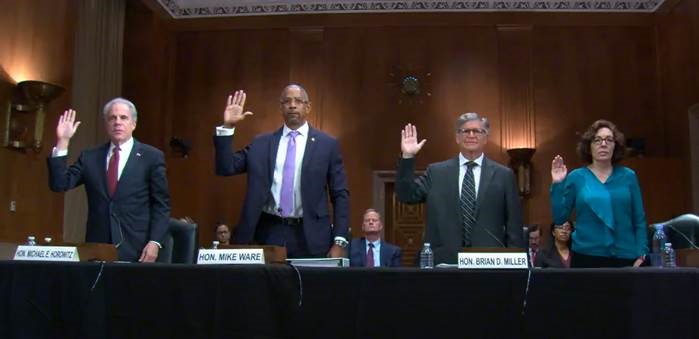Washington, DC — Michael E. Horowitz, Chair of the Pandemic Response Accountability Committee (PRAC) and Inspector General at the U.S. Department of Justice, testified before the U.S. Senate Committee on Homeland Security and Governmental Affairs, Emerging Threats and Spending Oversight Subcommittee, on Tuesday, November 14, 2023.
In his testimony, Chair Horowitz highlighted the PRAC’s ongoing pandemic oversight work and achievements since its formation in late March 2020, particularly the creation of the Pandemic Analytics Center of Excellence (PACE), which he urged Congress to make permanent beyond the PRAC’s scheduled sunset date of September 30, 2025.
“With the support of Congress, what we have developed over the past three years is a new model for conducting oversight in a crisis, drawing on the existing capabilities of the oversight community and surging capacity where needed,” said Chair Horowitz.

Chair Horowitz emphasized in his testimony:
The PRAC uses advanced data analytics to better target investigations and protect taxpayer dollars from fraud and improper payments.
In September 2021, Congress appropriated approximately $40 million for the PRAC to develop the PACE. This data analytics platform uses sophisticated software tools to help Offices of Inspector General (OIGs) identify fraud and improper payments.
As Chair Horowitz noted during his testimony, the PRAC issued a Fraud Alert on January 30 that highlighted the use of over 69,000 questionable Social Security Numbers (SSNs) to obtain $5.4 billion in Small Business Administration (SBA) pandemic loans and grants. Had the PACE existed at the outset of the pandemic, these suspicious applications could have been flagged for further review by SBA and SBA OIG before the money was disbursed, which could have saved taxpayers billions of dollars.
The PACE is also a critical asset for law enforcement, including the PRAC Fraud Task Force, to root out identity theft, multi-dipping When a recipient receives money from multiple federal sources and uses it for the same purpose, this could be an indication of multi-dipping. , and other types of fraud. As of September 2023, the PACE has provided investigative support to more than 40 federal law enforcement and OIG partners on over 600 pandemic-related investigations with nearly 7,600 subjects and an estimated fraud loss of $1.77 billion.
The PRAC urges Congress to take legislative action to sustain the PACE and expand the oversight community’s ability to pursue pandemic fraudsters.
Chair Horowitz stressed that as the world moves beyond the pandemic, the focus of the PACE should be broadened to prevent and detect fraud and improper payments across all federal programs.
“The sustainment and expansion of the PACE and its capabilities will ultimately ensure that our federal government is equipped with resources to face avoidable oversight risks when our country encounters its next crisis that requires emergency relief funding and effective oversight of that funding, or those associated with the annual federal government appropriated funding and spending,” said Chair Horowitz.
In addition, the PRAC strongly supports legislative actions that would bolster the oversight community and law enforcement partners’ ability to hold accountable those who defrauded pandemic relief programs. First, an extension of the statute of limitations for pandemic-related unemployment insurance fraud from five to 10 years; and, second, an amendment to the Program Fraud Civil Remedies Act to raise the jurisdictional limit for administrative recoveries of “smaller” false or fraudulent claims from $150,000 to $1,000,000. If signed into law, these critical pieces of legislation would ensure fraudsters do not escape justice.
The PRAC promotes transparency, collaboration, and accountability across the oversight community.
“The PRAC looks forward to continuing to maximize our efforts to promote transparency and accountability, support and coordinate independent oversight of pandemic relief spending, transform oversight by using data and advanced analytics, and document lessons learned and best practices for use in the future,” said Chair Horowitz.
Read the Chair's full statement.
###
The PRAC was established by the CARES Act to promote transparency and support independent oversight of the funds provided by the CARES Act and other related emergency spending bills. In addition to its coordination and oversight responsibilities, the PRAC is tasked with supporting efforts to “prevent and detect fraud, waste, abuse, and mismanagement [and] mitigate major risks that cut across program and agency boundaries.”
If you have additional questions, please contact Lisa Reijula at lisa.reijula@cigie.gov and Kirstyn Flood at kirstyn.flood@cigie.gov.

